Related Research Articles
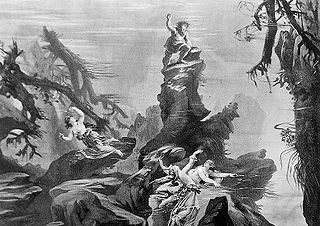
Der Ring des Nibelungen, WWV 86, is a cycle of four German-language epic music dramas composed by Richard Wagner. The works are based loosely on characters from Germanic heroic legend, namely Norse legendary sagas and the Nibelungenlied. The composer termed the cycle a "Bühnenfestspiel", structured in three days preceded by a Vorabend. It is often referred to as the Ring cycle, Wagner's Ring, or simply The Ring.

Das Rheingold, WWV 86A, is the first of the four music dramas that constitute Richard Wagner's Der Ring des Nibelungen. It was performed, as a single opera, at the National Theatre Munich on 22 September 1869, and received its first performance as part of the Ring cycle at the Bayreuth Festspielhaus, on 13 August 1876.
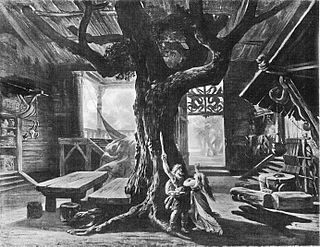
Die Walküre, WWV 86B, is the second of the four music dramas that constitute Richard Wagner's Der Ring des Nibelungen. It was performed, as a single opera, at the National Theatre Munich on 26 June 1870, and received its first performance as part of the Ring cycle at the Bayreuth Festspielhaus on 14 August 1876.

The Bayreuth Festival is a music festival held annually in Bayreuth, Germany, at which performances of stage works by the 19th-century German composer Richard Wagner are presented. Wagner himself conceived and promoted the idea of a special festival to showcase his own works, in particular his monumental cycle Der Ring des Nibelungen and Parsifal.

Patrice Chéreau was a French opera and theatre director, filmmaker, actor and producer. In France he is best known for his work for the theatre, internationally for his films La Reine Margot and Intimacy, and for his staging of the Jahrhundertring, the centenary Ring cycle at the Bayreuth Festival in 1976. Winner of almost twenty movie awards, including the Cannes Jury Prize and the Golden Berlin Bear, Chéreau served as president of the jury at the 2003 Cannes festival.

Wolfgang Wagner was a German opera director. He is best known as the director (Festspielleiter) of the Bayreuth Festival, a position he initially assumed alongside his brother Wieland in 1951 until the latter's death in 1966. From then on, he assumed total control until he retired in 2008, although many of the productions which he commissioned were severely criticized in their day. He had been plagued by family conflicts and criticism for many years. He was the son of Siegfried Wagner and he was the great-grandson of Franz Liszt.

Wieland Wagner was a German opera director, and grandson of Richard Wagner. As co-director of the Bayreuth Festival when it re-opened after World War II, he was noted for innovative new stagings of the operas, departing from the naturalistic scenery and lighting of the originals.
Josef Greindl was a German operatic bass, remembered mainly for his performances of Wagnerian roles at Bayreuth beginning in 1943.
Arnold van Mill was a Dutch bass opera singer.
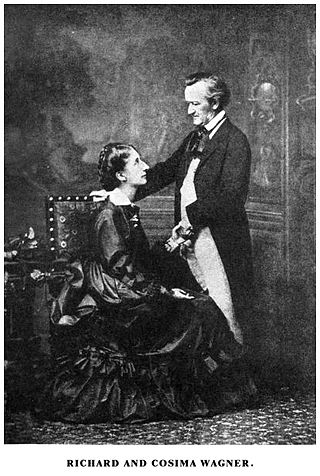
The Bayreuth canon consists of those operas by the German composer Richard Wagner (1813–1883) that have been performed at the Bayreuth Festival. The festival, which is dedicated to the staging of these works, was founded by Wagner in 1876 in the Bavarian town of Bayreuth, and has continued under the directorship of his family since his death. Although it was not originally held annually, it has taken place in July and August every year since the 75th anniversary season in 1951. Its venue is the Bayreuth Festspielhaus, which was built for the first festival. Attendance at the festival is often thought of as a pilgrimage made by Wagner aficionados.

Eva Wagner-Pasquier is a German opera manager. She is the daughter of Wolfgang Wagner and Ellen Drexel. She was born by candlelight in her grandmother Winifred's cottage in the Fichtel Mountains.
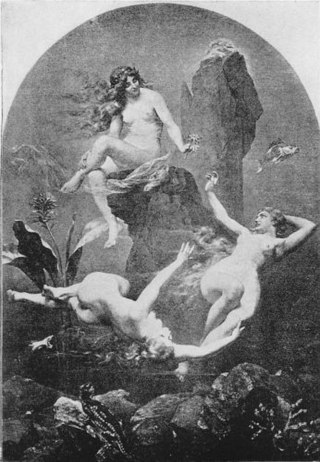
The Rhinemaidens are the three water-nymphs who appear in Richard Wagner's opera cycle Der Ring des Nibelungen. Their individual names are Woglinde, Wellgunde and Flosshilde (Floßhilde), although they are generally treated as a single entity and they act together accordingly. Of the 34 characters in the Ring cycle, they are the only ones who did not originate in the Old Norse Eddas. Wagner created his Rhinemaidens from other legends and myths, most notably the Nibelungenlied which contains stories involving water sprites (nixies) or mermaids of the Danube.

Parsifal is a 1982 West German-French opera film directed by Hans-Jürgen Syberberg, based on the opera of the same name by Richard Wagner. It was shown out of competition at the 1982 Cannes Film Festival.
The four operas of Richard Wagner's cycle Der Ring des Nibelungen together take about 15 hours, which makes for several records, tapes, or CDs, and much studio time. For this reason, many full Ring recordings are the result of "unofficial" recording of live performances, particularly from the Bayreuth Festival where new productions are often broadcast by German radio. Live recordings, especially those in monaural, may have very variable sound but often preserve the excitement of a performance better than a studio recording.
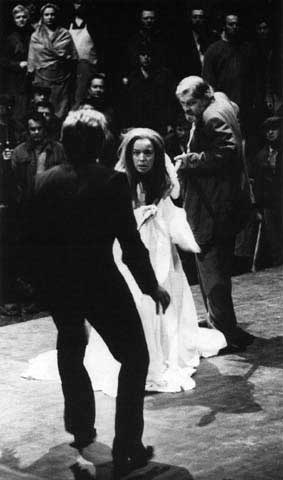
The Jahrhundertring was the production of Richard Wagner's Ring cycle, Der Ring des Nibelungen, at the Bayreuth Festival in 1976, celebrating the centenary of both the festival and the first performance of the complete cycle. The festival was directed by Wolfgang Wagner and the production was created by the French team of conductor Pierre Boulez, stage director Patrice Chéreau, stage designer Richard Peduzzi, costume designer Jacques Schmidt and lighting designer André Diot. The cycle was shown first in 1976, then in the following years until 1980. It was filmed for television in 1979 and 1980. While the first performance caused "a near-riot" for its brash modernity, the staging established a standard, termed Regietheater, for later productions.
Evelyn Herlitzius is a German opera singer, a dramatic soprano. She is known for performing major roles in works by Richard Wagner and Richard Strauss, such as Brünnhilde, Isolde and Elektra, at the Semperoper, the Bayreuth Festival and leading European opera houses.
Regieoper is a form of Regietheater specific to opera. In Regieoper, the stage director assumes a central role in determining the concept of an opera, often exchanging the established traditions related to that opera for an approach that may or may not adhere to the composer's or librettist's original intention. The director's approach may include but is not limited to changing the staging intended by the composer or librettist, modernizing the story to reflect contemporary political controversies, and infusing the production with shock value.
Emil Preetorius was a German illustrator and graphic artist. He is considered one of the most important stage designers of the first half of the 20th century.
Joachim Herz was a German Opera director and manager. He learned at the Komische Oper Berlin as an assistant to Walter Felsenstein. His major stations were the Leipzig Opera where he opened the new house with Wagner's Die Meistersinger von Nürnberg, Komische Oper and Semperoper in Dresden, where he opened the restored house with Weber's Der Freischütz in 1985. He staged many world premieres, and worked internationally. Herz was the first director to apply Felsenstein's concepts to Wagner's Der Ring des Nibelungen, staged in Leipzig from 1973 to 1976.
References
- ↑ Neil Fisher, The Times (London), 12 May 2006 (Subscription required): "Take his Tosca for Opera North, where every single act took place in a dingy church basement and Scarpia was a Berlusconi stooge in a dirty mac. Or the colourful Spanish dances of de Falla's La vida breve , hauntingly reimagined by Alden for the same company as a ritual suicide in a sweatshop. Or his now classic adaptation of Turandot for Welsh National Opera and English National Opera, which put the murderous Chinese princess in killer heels and a Maggie Thatcher power suit.
- ↑ Stephen Moss, "Twin Powers", The Guardian (London), 26 May 2006: "Christopher's production of Rigoletto for the Lyric Opera of Chicago in 2000 was dismissed by some influential backers as "trashy" and never revived. That production, which he set in a Victorian gentlemen's club and turned into an examination of sexual morality, seems to have tarnished his reputation among operatic managements anxious not to offend their audiences in these financially and artistically straitened times. 'My American career is now pretty well over,' he says. 'It takes a few years before you find that no one dares to hire you.'"
- ↑ Bernard Shaw, The Perfect Wagnerite (1883) on www.marxists.org Regarding Wagner's Socialist leanings (which forced him into exile in Switzerland and France), Shaw writes that "we have reached the point at which some foolish person is sure to interrupt us by declaring that The Rhine Gold is what they call 'a work of art' pure and simple, and that Wagner never dreamt of shareholders, tall hats, whitelead factories, and industrial and political questions looked at from the socialistic and humanitarian points of view." Later, in summing up The Ring: "there is a considerable portion of The Ring, especially the portraiture of our capitalistic industrial system from the socialist's point of new in the slavery of the Niblungs and the tyranny of Alberic, which is unmistakable, as it dramatizes that portion of human activity which lies well within the territory covered by our intellectual consciousness ... Its meaning was as clear to Wagner as it is to us."
- ↑ Lisa Hirsch: "Two brilliant stars overcome bizarre and muddled staging in San Francisco Opera's Capuleti", 30 September 2012, theclassicalreview.com: "The two (DiDonato and Cabell) made a splendid romantic couple. They would have been even more successful had the staging been more sympathetic and character-focused. Instead, director Vincent Broussard, set designer Vincent Lemaire, and costumer designer Christian Lacroix, all in their San Francisco Opera debuts, have put together a muddled and static Regie Lite production that neither entertained nor cast the kind of illumination on (Bellini's I Capuleti e i Montecchi ) that a thoughtful production by a more gifted director might have rendered. The very first scene tells just about everything you might need to know about the production. The set is a shallow box with abstract patterns projected on the walls."
- ↑ Fisher notes: "You'll never catch Christopher Alden drowning an opera with the cocktail of sex, drugs and violence applied over and over again by Calixto Bieito."
- ↑ Ring in a day: Review of DVD recordings of The Ring, BBC Radio 3, April 2006, retrieved 28 June 2013.
- ↑ In Fisher, The Times, 12 May 2006
- ↑ "What Are the Limits of Stage Direction?" by Speight Jenkins, OperaSleuth, 14 July 2014
- ↑ A review on a Philadelphia production of Charles Gounod's Roméo et Juliette .